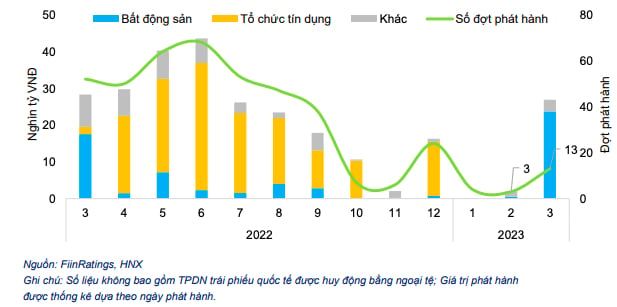13 lots of bonds issued
According to a recently published report by the credit rating company FiinRating, the corporate bond market has seen a reversal in issuance activities in March. Specifically, a total of 13 bond lots with a total value of nearly VND27 trillion were successfully issued. Real estate businesses accounted for 6 lots issued, with a value of VND23.7 trillion.
In addition to 12 individual corporate bond lots, there is 1 public bond lot from Masan Group Corporation with a value of 2 trillion VND. Since the beginning of the year, this enterprise has issued a total of 3 public bond lots with a total value of 3.5 trillion VND.

The number of successfully issued bonds has increased significantly, especially in the real estate business group (Photo: FiinRatings)
The value of private issuance in March increased 3 times compared to the previous month and more than 2 times compared to the same period in 2022. However, FiinRating believes that it cannot be affirmed that the market will be active again from the second quarter of 2023, but it will be necessary to monitor some moves from the management side to remove difficulties for the market, and at the same time restore the confidence of individual investors.
In contrast, the scale of bonds bought back before maturity in March reached nearly 18 trillion VND, 3 times higher than the previous month and nearly 2.08 times higher than the same period in 2022.
However, this is also the first month since October 2022 that the repurchase scale is lower than the issuance scale, marking the first time in 5 months that the market value of Vietnamese corporate bonds has increased since Decree 65/2022/ND-CP was issued. A positive signal for the capital and liquidity issues of bond-issuing enterprises.
FiinRating commented that these positive signals come from the reduction of operating interest rates, Decree 08/2023/ND-CP, Resolution 33/NQ-CP on removing and promoting the real estate market and most recently the establishment of a working group to remove obstacles for real estate projects. This is also the premise for the corporate bond market to gradually recover because the legal factor is the biggest risk in the credit market.
There are 90 businesses in debt.
Notably, despite the sharp increase in repurchase activities, the total value of individual corporate bonds maturing in the remaining period of the year is still quite high, at over VND220 trillion. Real estate enterprises have outstanding bonds maturing at about 40%, at VND93.2 trillion.
Of which, the total outstanding debt of individual bonds maturing in the next two quarters will be VND36.2 trillion in the second quarter and VND35.4 trillion in the third quarter, respectively. These are significantly large numbers compared to the total credit scale serving real estate business as well as the credit capacity of real estate enterprises at present.
With the pressure of maturing debt due in 2023, FiinRating experts also forecast that the bad debt ratio of bonds will continue to increase in the second and third quarters of 2023. Especially at a time when the real estate market has not shown many signs of improvement.

Many businesses are facing pressure to mature bonds.
According to this report by FiinRatings, the number of enterprises announcing late payment of principal and interest on bonds continues to increase. As of April 17, the market has recorded 89 issuers delaying the performance of corporate bond debt obligations, with a total value of more than VND110 trillion.
According to information from the Hanoi Stock Exchange (HNX), since the beginning of April 2023, 14 businesses have announced late bond repayments. Of which, the real estate group continues to account for a high proportion. Some businesses explained that the late payment was due to difficulties in the real estate market, tightening credit, and reduced payments affecting cash flow from projects.
FiinRatings' report also stated that 48% of late bond issuers are related. Of these, 27% of late issuers belong to the same group (in parent-subsidiary ownership relationship, or the same parent company), 13% of late issuers have the same representative/ownership legal entity, and the remaining 7% are affiliated partners, contributing capital to each other.
Source







































































































Comment (0)